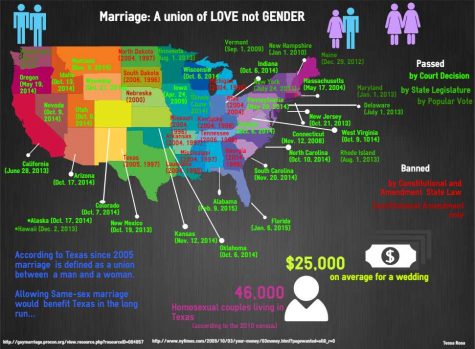Texas ban denies fundamental rights

For conservative states such as Texas, it is often hard to come to terms with the reality of life today. Even so, there is no excuse for the lack of understanding and prejudice in Texan politics. Whether politicians agree with the idea of gay marriage or not, Texans should give the same basic rights to Texan citizens, which includes the right to marry.
According to Texas law, marriage has been defined as “the union between one man and one woman” since 2005. In early February, however, a Texas probate judge ruled that the gay marriage ban was unconstitutional. The judge declined, however, to make an official ruling until the case had been heard by a higher-ranking court: the Fifth Circuit Court of Appeals. In response to the decision, hundreds of “Bible Marriage” protesters crowded outside the state Capitol. This protesting only shows the discrimination and hatred against gays still felt in Texas.
There are basic rights that every human being should receive from birth, and they are outlined in the Universal Declaration of Human Rights, adopted by the United States and several other countries in 1948. One of those rights, currently being violated by Texas lawmakers, is the right to marriage. By not allowing gay couples to receive marriage licenses, Texas is stubbornly refusing to stop violating the rights of its own citizens.
If not for moral reasons, then perhaps Texas should consider the economic value of gay marriage. According to the 2010 census, there are an estimated 46,000 gay couples living in Texas and the average cost of a wedding is around $25,000. For suit shops, bridal stores or even wedding venues, that is an added $1.1 billion in revenue. There are also extra tax benefits for unmarried couples, which provides less money to the state and federal government if gay marriage is not legal. According to a 2009 New York Times article, the expense that homosexuals incur in states where gay marriage is illegal is higher than $40,000 per person, a huge burden for the average family.
There are also burdens placed on state governments when gay marriage is legal, however. There are benefits and laws that are exclusive to married couples, so if a state does not consider the marriage to be legitimate, the state does not have to provide things such as Social Security benefits for the couple. Certain types of businesses such as health care providers also face more problems when gay marriage is legal, which is why many companies publicly oppose gay marriage. For some individuals, religious conflicts also play a big role, because many Christian churches oppose the idea of gay marriage.
The burdens placed on gay couples far outweigh any drawbacks, however. It is estimated that there are over 1,000 benefits that gay couples do not receive in Texas simply because one constitutional amendment tells them they cannot get married. The price for change, while sometimes quite high, does not constitute the blunt prejudice of banning gay marriage. Students in Texas, or even Minnesota, should always support the fundamental rights of American citizens, even if lawmakers will not.








Tessa Rosa • Apr 21, 2015 at 8:45 pm
Amazing article!!!! I really like how you added the cost of weddings and how much that would benefit Texas. I like how your opinion is clearly known. The article overall flows really nicely, and I like how you include both sides. You state how there is drawbacks, but that the benefits out weigh them. This is a really good article!!!